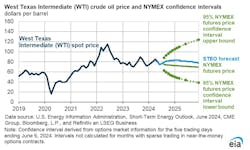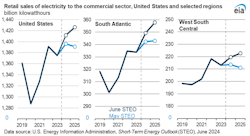The U.S. Energy Information Administration (EIA) expects Permian Basin crude oil production to average 6.3 million barrels per day in 2024, an increase of nearly 8% from 2023, according to EIA’s June Short-Term Energy Outlook (STEO).
The Permian Basin accounts for nearly half of U.S. crude oil production, and the agency—which expanded its STEO to include regional trends in the top U.S. oil and natural gas production areas—expects increased production in the Permian and other regions will drive U.S. oil production to successive records in 2024 and 2025.
“Incorporating regional forecasts of oil and natural gas production helps us tell a more comprehensive story of hydrocarbon production trends in the United States,” EIA Administrator Joe DeCarolis said in a news release. “Consider the natural gas market, where we’ve seen prices decline far more rapidly than production. We knew that associated natural gas, which is produced as a byproduct of increasing crude oil production, was a driver of relatively stable natural gas production.
“Now our forecasts clearly show the important regional relationship of oil and natural gas production.”
EIA expects U.S.-marketed natural gas production to decrease slightly more than 1% this year in response to low natural gas prices. Production is forecasted to increase in the Permian, Bakken, and Eagle Ford regions this year, while declining in the other major producing regions.
Other highlights from the June STEO include:
- U.S. electricity consumption. EIA revised its forecasts for electricity consumption by customers in the U.S. commercial sector upward to reflect expectations for greater power demand from data centers. EIA forecasts that electricity consumption by the commercial sector will increase 3% this year. The largest revisions in EIA’s forecast are in the South Atlantic and West South Central regions; EIA expects 5% growth in commercial electricity demand in the South Atlantic region and 3% growth in the West South Central region this year.
- Summer electricity bills. EIA expects that residential electricity customers’ average monthly bills will be similar to last summer’s average: $173 compared with $168 last summer. EIA forecasts that the national average price of electricity will be about the same this summer as last summer, but that the average U.S. household will consume more electricity—primarily to power air conditioning. EIA will publish an additional supplement analyzing summer electricity usage and expenditures.
- Distillate fuel. EIA expects 1% more distillate fuel will be consumed in the United States in the second half of this year than in the same period last year, as increases in manufacturing lead to more on-highway trucking—the single largest end use of distillate fuel oil.


